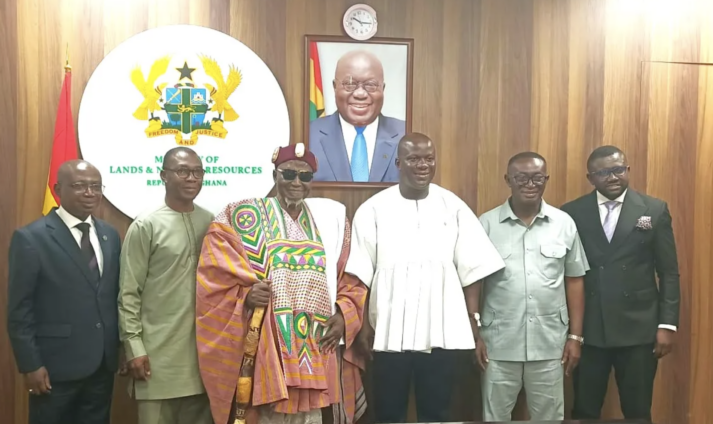A five-member committee entrusted with reviewing the Lands Commission’s Report on Land De-vesting has recommended that all vested lands not occupied by state institutions be returned to their pre-acquisition owners.
The Committee proposed that state entities in occupation and possession of vested lands pay tokens to the pre-vesting owners for continued use of the lands.
The Committee also recommended the formation of a management committee comprised of the Lands Commission, landowners, and users of vested lands to manage the interests of lands with complex acquisition and usage.
The Committee, chaired by Andy Kwame Appiah-Kubi, Member of Parliament for the Asante-Akim North, presented its report to Mr Samuel Abu Jinapor, Minister of Lands and Natural Resources, at a brief ceremony in Accra on Monday.
Other Members of the Committee were: Kumbun-Naa Alhaji Naa Abu Iddrisu II, representing the National House of Chiefs, Dr. Wordsworth Odame-Larbi, representing the Ghana Institute of Surveyors, Mr Dennis Adjei-Dwomoh, representing the Ghana Bar Association, and Mr Maxwell Adu-Nsafoa, the Technical Director for Lands at the Ministry of Lands and Natural Resources.
The Lands Commission, in June 2021, established a twelve-member committee, chaired by Ms Mabel H. Yemidi, the Director of the Public and Vested Lands Management Division of the Lands Commission, to evaluate the status of vested lands, collate the views of the pre-vesting owners, and make recommendations to the President.
Subsequently, Mr Jinapor, in February 2022, set up the Appiah-Kubi Committee to review the Yemidi Committee report, and make recommendations to the Minister on all matters relating to de-vesting, for his review and onward submission to the President.
Mr Appiah-Kubi told journalists after presenting the Report that the committee engaged chiefs and pre-acquisition owners whose lands had been vested in the state.
“The chiefs were very magnanimous in agreeing to a peppercorn contract on those state properties which require that the state will have to only just pay token for its continuous use of such lands and in effect the chiefs have agreed to grant such lands to the various state institutions that are in occupation and possession of such lands.
“Beyond that the committee recommends that all other vested lands be de-vested back to the pre-acquisition owners,” he said.
Mr Appiah Kubi said the committee encountered multiple claims including lands in the Prampram areas and thus could not offer conclusive recommendations on those lands.
“We have asked the Minister for leave to be able to go back into such situations and manage the multiple claims to be able to resolve the issue of who is the legitimate owner of that land,” he said.
Mr Jinapor said the issue of vested lands was a matter of concern for traditional authorities and gave an assurance that the issue would be addressed “once and for all” following the presentation of the report.
“This Report will guide the Government in dealing with the issue of vested lands. I will look at it and make recommendations to the President.
“In the not-too-distant future, the long-standing issue of vested lands will be dealt with once and for all,” the Minister said.
Background
The Stool Lands (Validation of Legislation) Act, 1959, the Stool Lands Act, 1960 (Act 27) and the Administration of Lands Act 1962, (Act 123), empowered the President to vest stool lands in himself and that was extended to the whole country.
Section 7 of Act 123, for example, empowered the President, to, by Executive Instrument, declare any stool land to be vested in the President in trust, if it appeared to the President to be in the public interest.
However, following the passage of the 1992 Constitution, the vesting regime changed. Per article 257(3) and (4) of the Constitution, all northern territories lands, which were vested in the President, were de-vested, and same vested in the appropriate Skins.
Article 267(1) of the Constitution also vested all stool lands “in the appropriate stool on behalf of and in trust for the subjects of the stool in accordance with customary law and usage.”
Subsequently, the Land Act, 2020 (Act 1036) enjoined the Lands Commission, to begin the process of evaluating all existing vested lands with the view to recommending to the President, the de-vesting of those lands within six months of the coming into force of this Act.
Consequently, the Lands Commission, in June 2021, established the Yemidi, Committee to investigate vested lands and make recommendations to the President.
Latest Stories
-
Gold Fields Ghana Foundation challenges graduates to maximise benefits of community apprenticeship programme
1 hour -
GBC accuses Deputy Information Minister Sylvester Tetteh of demolishing its bungalow illegally
2 hours -
Boost for education as government commissions 80 projects
2 hours -
NAPO commissions library to honour Atta-Mills’ memory
2 hours -
OmniBSIC Bank champions health and wellness with thriving community walk
2 hours -
Kora Wearables unveils Neo: The Ultimate Smartwatch for Ghana’s tech-savvy and health-conscious users
2 hours -
NDC supports Dampare’s ‘no guns at polling stations’ directive
2 hours -
Police officer interdicted after video of assault goes viral
2 hours -
KNUST’s Prof. Reginald Annan named first African recipient of World Cancer Research Fund
2 hours -
George Twum-Barimah-Adu pledges inclusive cabinet with Minority and Majority leaders
3 hours -
Labourer jailed 5 years for inflicting cutlass wounds on businessman
3 hours -
Parliament urged to fast-track passage of Road Traffic Amendment Bill
3 hours -
Mr Daniel Kofi Asante aka Electrician
3 hours -
Minerals Commission, Solidaridad unveils forum to tackle child labour in mining sector
3 hours -
Election 2024: Engagement with security services productive – NDC
3 hours

